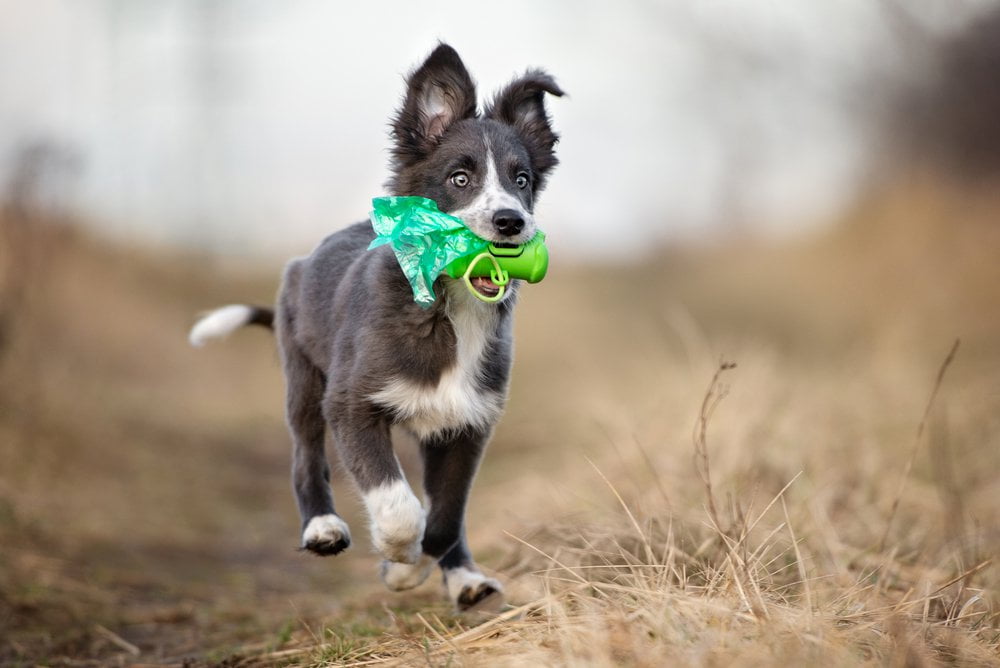

How often should a puppy poop?
If you’ve recently welcomed a new puppy into your home – or are considering doing so soon – you’re probably full of questions, including ‘How often do puppies poop?’
The answer? Quite a lot! But keeping track of their habits isn’t just about house training—it’s key to their health. Read on to explore puppy digestion tips and what you need to know about their pooing habits.
How many times does a puppy poo a day?
Puppies poo more often than adult dogs, and that’s completely normal! Their small digestive systems work hard to absorb nutrients and support growth. So, how many times does a puppy poop in a day? Here’s what to expect:
- 2–4 weeks old: Puppies poop after each feeding—about 6-8 times daily
- 8–12 weeks old: At this stage, expect 3-5 poos a day
- 3–6 months old: Their bathroom frequency starts to settle at around 2-4 times daily
- 6–12 months old: By now, their digestive system is more mature, so they’ll poo about 2-3 times a day, similar to an adult dog
How much should puppies poop?
Of course, every puppy is different, and you’ll get to know what’s normal for your pup. But if you notice them pooing way more or less than usual, it might be time to pay closer attention. Factors like size, diet, and activity levels all play a role.
Young puppies have small, frequent stools, while older ones produce larger, firmer poops. If their stools are too small and dry, they might need more water. However, if they’re going too often or their stool is loose, their food may not agree with them.
What if your puppy poos a lot more than normal?
Some days, it might feel like your puppy is pooing non-stop. If they suddenly start going more often, check their stool consistency – is it loose or watery? Stress, diet changes, or even parasites could be the cause. If it continues for more than a day, it’s time to call the vet. Puppies often get parasites, so deworming and stool checks are essential.
What if your puppy doesn’t seem to be pooping enough?
If your puppy hasn’t pooped in a while, you should definitely consider what’s going on. The lack of action may be due to dehydration, diet changes, or a potential blockage. Watch for signs like straining, bloating, or low energy.
If your pup hasn’t pooped in 24 hours or seems uncomfortable, don’t wait—call the vet. Constipation may clear up, but serious blockages need immediate attention.
When should a puppy poo?
Puppies are pretty predictable when it comes to bathroom breaks. Most puppies poop right after eating since they digest food quickly. Circling, sniffing, or restlessness means it's time to go out.
The key to smooth house training is a good routine. Take your puppy out first thing in the morning, after meals, after naps, and before bedtime. Consistency and positive reinforcement will help them learn when and where to go.
What should puppy poop look like?
So, what should puppy poop look like? Healthy puppy poo is soft, brown and well-formed. It shouldn’t be too runny or too hard.
Stool size varies with your puppy's size and diet. A small amount of mucus is normal, but it should never be blood-tinged. Be aware of undigested material, as this could signal a potential problem.
Over time, you’ll recognise what’s normal for your puppy. Any sudden changes should prompt a call to the vet. For a full guide, check our dog poop chart to easily spot normal and abnormal signs.
Probiotics for dogs: a simple way to support digestive health
Understanding your puppy’s bathroom habits is key to their health. Frequent pooing is normal, but sudden changes – more or less – shouldn’t be ignored. A balanced diet, daily exercise, regular vet visits, and plenty of love help keep digestion on track.
Daily probiotics for dogs can be a game-changer for gut health and can be given to puppies from 3-months onwards. These beneficial bacteria can help balance digestion, making bowel movements smoother and more regular. If your puppy has digestive issues, probiotics can help support a healthy tummy and keep tummy trouble at bay.
Ultimately, trust your instincts as a pet parent. If something seems off, check with your vet sooner rather than later. Watching your puppy’s bathroom habits and using probiotics supports digestion. A happy tummy means a happy pup—full of energy, health, and plenty of tail wags.
“Your puppy's poo can be an indicator of their digestive health, so it’s important to pay attention and communicate with other members of the family if you’re sharing cleaning up duties. Regular monitoring means you can spot issues early, potentially saving you any further worry.”
YuMOVE in-house Technical Vet Nurse Lana Foster




